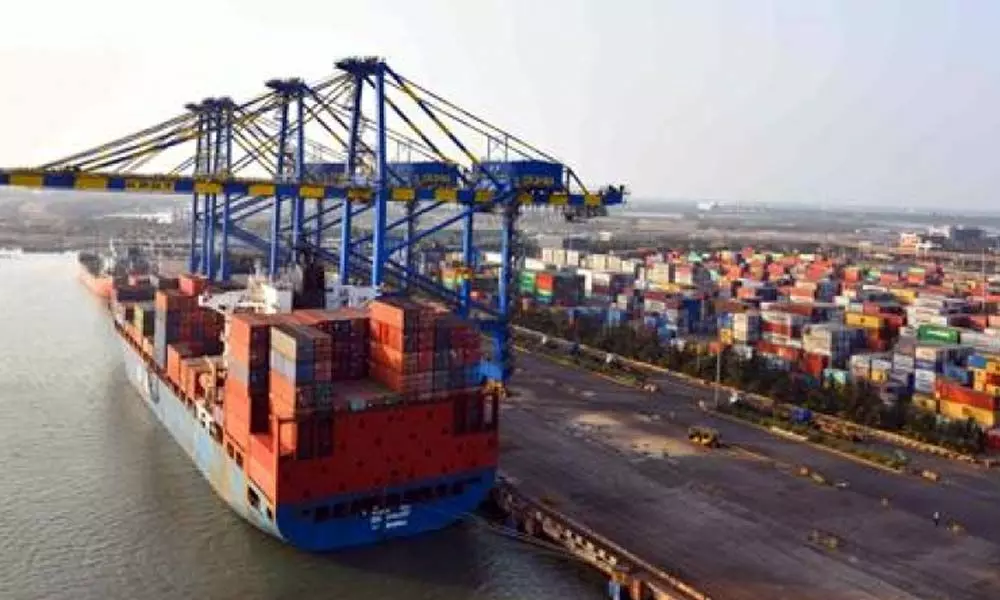Live
- Congress in Himachal to hold event in Bilaspur to mark two years at helm
- Hitaashee takes third title of the season, wins 14th leg of WPGT
- Group-3 exams in Wanaparthy district peacefully*
- Shraddha Das reigns as a fashion icon
- ‘Sarangapani Jathakam’ teaser set for Nov 21st release
- Nadendla Manohar announces WhatsApp services for grain purchase
- AP DCM Pawan Kalyan Addresses Public Rally in Ballarpur, Maharashtra
- ‘Pushpa The Rule’ trailer launch event: Massive fan frenzy in Patna
- Jyothika slams negative campaign on ‘Kanguva’
- It’s official: Naga Chaitanya and Sobhita Dhulipala to tie the knot in December
Just In
Protocol that lets Nepal access 7 Chinese ports for 3rd country trade to come into effect from February


The transit protocol allows Nepal access to seven Chinese sea and land ports for third-country trade. So far, all of Nepal's third-country trade takes place via India.
Kathmandu: Ten months after signing the Protocol on Implementing the Agreement on Transit and Transportation between Nepal and China, Beijing has officially notified Kathmandu that it has completed all domestic legal procedures which means that it would come into effect from February 1, it was reported.
Nepal and China signed the transit protocol in Beijing on April 29, 2019, during the visit of President Bidya Devi Bhandari, The Kathmandu Post said in a report on Wednesday.
The transit protocol allows Nepal access to seven Chinese sea and land ports for third-country trade. So far, all of Nepal's third-country trade takes place via India.
After completing all domestic procedures, Nepal, on August 9, had notified China and had been waiting for a notification from Beijing.
Informed officials said on Wednesday that China notified the Nepali Embassy in Beijing on December 25.
The embassy then forwarded the notification to Kathmandu and acknowledged the same to the Chinese Foreign Ministry on Tuesday, said officials.
"Now the deck is clear for Nepali businesspersons to conduct third-country trade via China," The Kathmandu Post quoted Navaraj Dhakal, joint-secretary at the Ministry of Industry and Commerce, as saying, adding: "But there are challenges ahead."
There were major concerns about infrastructure on the Nepali side, the lack of a trained workforce, and also a language barrier.
"We do not know how much time it will take for businesses to start importing goods from the nearest Chinese seaports," said Dhakal. "We also do not know the cost of consignments from Chinese seaports to Nepal."
The nearest Chinese seaport is Tianjin, which is 4,000 km from the Nepal border -- four times the distance between Birgunj and Kolkata in India.
According to Prakash Karki, president of Nepal Freight Forwarders Association, language could pose as a major issue while dealing with the Chinese.
"We are habituated to importing goods via India, where the language is not a problem," Karki told The Kathmandu Post. "But since we have never imported goods from China, we don't exactly know what the advantages or disadvantages will be."
Nepal only started looking to China for the possibility of third-country trade after the Indian border blockade of 2015.
During his visit to Beijing in 2016, Prime Minister K.P. Sharma Oli signed the Transit and Transportation Agreement aiming to break Nepal's complete dependence on India for third-country trade.
But it took almost three years to sign the protocol for the agreement.

© 2024 Hyderabad Media House Limited/The Hans India. All rights reserved. Powered by hocalwire.com






